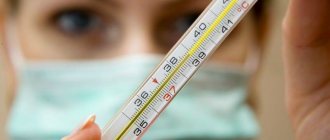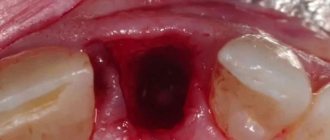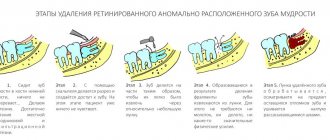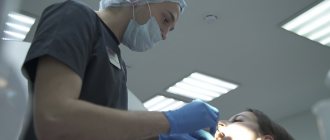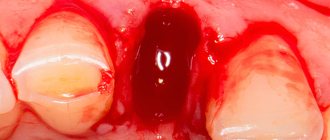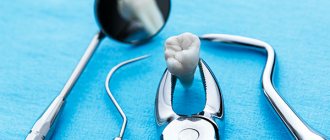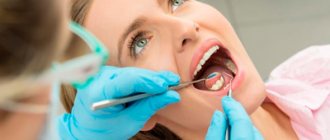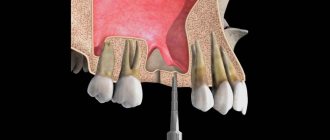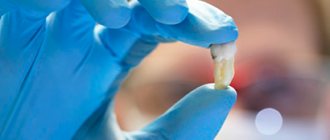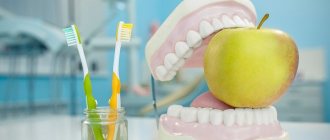Main activities after extraction
As soon as the tooth is removed, the doctor treats the empty socket and places a cotton swab soaked in the medicinal composition into it. In some cases, stitches may be required. On the recommendation of the dentist, the tampon is removed several hours after the manipulations.
During this time period, it is forbidden to eat, smoke, drink, talk, that is, it is better not to open your mouth at all. You should also not touch the hole with your fingers or insert foreign objects into it. To disinfect (disinfect) the oral cavity, you should use Furacilin, Miramistin, Chlorhexidine, Chlorophyllipt.
Important! To prevent postoperative bleeding, you should not bend over, lift heavy objects, visit saunas, or take hot baths.
Upon completion of the extraction, patients can be prescribed antibacterial compounds in various dosage forms - tablets, capsules, drops, local solutions and applications
Indications for antibiotic therapy
Antibiotics after tooth extraction are prescribed if the operation was carried out against the background of a purulent-inflammatory process in the socket, on the mucous membrane or gum (for example, gingivitis, periodontitis). In case of flux with a cyst, an antibiotic should be taken to stop the inflammatory process and stop the growth and reproduction of its causative agents - pathogenic bacteria.
Important! Antibiotics after tooth extraction do not cope with pain, swelling and swelling, so they are supplemented with anti-inflammatory and antihistamines. If extraction was necessary for prosthetics or installation of braces (rarely practiced), it is enough to treat the oral cavity with antiseptic solutions. It would be advisable to take antibiotics after tooth extraction only if there are symptoms of an inflammatory process.
It is necessary to take antibiotics after wisdom tooth removal in the following cases:
Antibiotics for tooth flux
- infection of a postoperative wound (poor oral hygiene, stones, a large number of teeth affected by caries);
- suppuration;
- the area of the wound surface exceeds 1 cm2;
- immune failure in the body;
- diabetes mellitus (the course of this disease is accompanied by slow wound healing).
In addition, taking antibiotics after wisdom tooth removal is required if the wound bleeds; in parallel, the surgeon performed an intervention on the bone tissue; osteoplastic materials were used to avoid rejection.
Side effects
Long-term use of antibiotics may cause side effects
Their manifestation can be triggered by incorrect selection and prescription of the drug, as well as if the rules for its use have been violated.
The pharmacodynamics of antibiotics is based on the absorption of the active substances of the drug by the intestines, followed by its distribution throughout all tissues of the body.
The active substances of the antibiotic undergo breakdown in liver cells and, together with bile, feces and urine, are excreted from the body.
With long-term use of the drug, the following side effects may occur:
- Development of dysbacteriosis or candidiasis.
- Attacks of nausea.
- Vomiting.
- Inflammatory processes in the oral cavity.
- Allergic dermatitis on the skin of the body and face.
- Minor vascular bleeding in the oral cavity.
- Kidney and liver dysfunction.
- Weakening of the body's protective functions.
Important! If side effects occur, you should immediately stop taking the drug and replace it as prescribed by your doctor.
How to select medications
The answer to the question of whether you need to take antibiotics after tooth extraction has been received. Now it is necessary to find out what means should be taken in this or that case. The selection of a drug for a child or adult patient is carried out based on the general condition of the patient’s body, the presence (absence) of an allergic reaction to certain medications, the localization and degree of the inflammatory process.
Antibiotics after tooth extraction must meet the following requirements:
- medicinal components must penetrate well not only into the gum tissue, but also into the bone tissue;
- ensuring a cumulative effect for prolonged action of the drug;
- maintain the required concentration for at least 8 hours so that the patient can conveniently take medications (not “get out of line” with the therapy regimen);
- Aerobic and anaerobic microflora must be susceptible to the antibiotic;
- minimum side effects, minor toxic effects on the body;
- the product must be suitable for outpatient treatment.
Inflammatory processes, bacterial infections, and other associated dental problems are the main indications for antibiotic therapy after tooth extraction
Contraindications
Antibacterial drugs are prescribed exclusively by a doctor, as drugs in this group have a wide range of contraindications. This takes into account the physiological characteristics of the body, the presence of chronic diseases and the age category of the patient.
Antibacterial drugs should not be used in the following cases:
- Each antibacterial drug has its own list of main contraindications and features of its use.
Dysfunction of the digestive system.
- Breastfeeding period.
- During gestation of an intrauterine fetus.
- Individual intolerance to the drug.
- The presence of allergic reactions to the components of the antibiotic.
- Kidney failure.
- Liver diseases of any etiology.
- Age category up to 12 years.
- Diabetes mellitus of any type.
- Arterial hyperplasia.
Each antibacterial drug has its own list of main contraindications and features of its use. Therefore, before using it, it is recommended to study the annotation for it.
Drugs
What antibiotics to take after tooth extraction: the list of the most common drugs in this drug group includes Amoxil, Ampisid, Clerimed, Sulcef, Sparfloxacin. Which antibiotic is best to eliminate postoperative complications: Amoxiclav, Arlet, Vilprafen, Oflocain, Cefazolin.
Thus, the well-known name Amoxiclav belongs to an antibacterial drug that is prescribed for purulent-inflammatory processes at the site of extraction. Sumamed enjoys undeserved popularity among modern dentists - this remedy copes well with urinary and respiratory tract infections, but is practically useless for infections of the oral cavity.
Tsifran - this drug demonstrates high rates of effectiveness if extraction was carried out against the background of other dental problems (including active inflammation). If a fungal infection is added to the bacterial infection, antibiotic therapy is supplemented with Nystatin tablets, Amphotericin ointment, and Tetracycline.
In rare cases, sepsis may develop after tooth extraction. This pathological process is often a consequence of immunodeficiency conditions, poor blood clotting, poor oral hygiene and patient non-compliance with dentist recommendations.
Types of antibiotics used in dentistry
To eliminate the symptoms and consequences of dental diseases, antibiotics of the following pharmacological groups can be used:
- Penicillins. The largest category of antibacterial agents. They are characterized by a wide spectrum of action and effectively destroy pathogenic microorganisms. They can be injected or used in tablet form.
- Macrolides. Remedies that are often used for diseases of the ENT organs. Dentists prescribe them only if the patient has poor tolerance to other antibacterial drugs or the pathogen is insensitive to penicillins.
- Cephalosporins. Medicines exhibiting excellent bactericidal properties. In dental practice, two representatives of the group are most often used - Cefaclor and Cephalexin.
- Lincosamides. Medicines that effectively control the inflammatory process. With their help, you can quickly eliminate inflammation and prevent further progression of dental complications. A popular representative of lincosamides is Lincomycin. It can be bought in the form of tablets, injections, ointments. The latter is suitable for tamponade of the inflamed socket.
- Fluoroquinols. Contains tsifran - a component that quickly destroys pathogenic flora. Indicated for purulent complications.
- Aminoglycosides. They are prescribed after extensive dental operations, if the wound is infected or the infection has entered the blood.
- Tetracyclines. They act by blocking protein synthesis in microbial cells. These include Oletetrin, Doxycycline. It should be noted that today tetracyclines are used less and less, since many modern infections are little sensitive to their active substance.
Treatment rules
The oral cavity is home to “healthy” rich microflora. Taking antibacterial drugs causes the death of the necessary lacto- and bifidobacteria and leads to a rapid increase in the number of pathogenic strepto-, pneumo-, and staphylococci.
Important! Taking antibiotics for dental diseases harms the microflora of the oral cavity in any case, regardless of which dosage form of the drug was chosen by the attending physician (oral medications, injections, capsules, drops, applications).
Treatment with antibiotics excludes the use of alcoholic beverages, psychotropic, sleeping pills and narcotic drugs. If we are talking about tablets, capsules or local antibiotics, then they are used an hour before or 2 hours after a meal, otherwise the absorption of the drug will be complicated. Take the tablets with warm boiled water.
How many days to take antibiotics: if there is no therapeutic effect after 2-3 days from the start of treatment, the drug must be replaced (or the dosage adjusted). Pregnant and lactating women, children, and patients with chronic diseases can take antibiotics only after consulting a doctor.
Antibiotics do not cope with pain and swelling, so patients who have undergone extraction are additionally prescribed antihistamines, anti-inflammatory and painkillers
Are antibiotics needed after tooth implantation or extraction?
There are still many “blank spots” in modern Russian implantology and surgical dentistry.
Despite the fact that domestic dentistry is already catching up with the European level of implantology on many issues, there are some simple, in my opinion, issues that cause controversy and disagreement among Russian doctors.
One of them is the prescription of antibiotics after dental implantation or extraction.
In Europe and America there are clear indications when, in what cases and in what doses antibiotics should be prescribed. And no one doubts this. There are simply no other options other than the official protocol.
In Russia, to my surprise, antibiotics are prescribed at random after implantation or tooth extraction. This may depend on many factors: on what university the doctor studied at, in what region he works, whether he sees a doctor in a private or public clinic. That is, the prescription of antibiotics after implantation or tooth extraction may actually depend on the doctor’s mood. Or from his knowledge. And even more often, unfortunately, from lack of knowledge.
If you don’t believe me, ask any Russian dentist who places implants or removes teeth, in what cases does he prescribe antibiotics?
You will be very surprised, but in 90% of cases the answer will be the same: if it’s a mild case, then we don’t prescribe it, if it’s a complex case, then we prescribe it just in case.
If you continue to ask: how many days should you take antibiotics? The answers will surprise you even more with their differences.
By the way, this is why this article will be useful not only to patients, but also to many implantologists.
So in what cases do we still prescribe antibiotics? The answer is very simple. There are 5 groups of surgical interventions, each of which involves the use of certain dosages of antibiotics, and for a certain number of days.
In words and terms understandable not only for professional doctors, but also for ordinary patients, I will briefly talk about these 5 groups.
1 group
Involves removing teeth without infection. Installation of single implants without flap formation.
In such cases, we do not prescribe antibiotics at all.
2nd group
Tooth extraction multiple or traumatic tooth extraction. Installation of several implants with the formation of a flap. Augmentation of sockets (plantation of artificial bone tissue).
In this case, we prescribe 1 gram of Amoxycillin an hour before the procedure, and 500 mg (1 tablet) after taking it 6 hours later. One time.
3 group
Ridge augmentation with the presence of a membrane and the use of grafts, all except autogenous ones. I translate it into simple human language (for patients): working with bone tissue, including artificial, without transplanting bone from another place.
Multiple implants with the formation of a full flap. Multiple simultaneous implantation.
In such cases, we prescribe 1 gram of Amoxycillin an hour before the procedure, then 500 mg (1 tablet) 3 times a day for 3 days.
4 group
Ridge augmentation (autogenous bone). I translate for patients: this is a bone block transplant from one place to another. For example, from the chin or ilium to a place where there is not enough bone tissue for implantation. Sinus lifting (closed). This is work in the maxillary sinus, without open access to it. Multiple implantation, when 8–10 implants are installed simultaneously.
In this case, we prescribe 1 gram of Amoxycillin an hour before the procedure, then 500 mg (1 tablet) 3 times a day for 5 days.
5 group
Open sinus lift. This is an operation to plant artificial bone tissue in the maxillary sinus, during which the surgeon makes a “window” in the bone tissue, thereby opening the maxillary sinus.
1 hour before open sinus lift we prescribe 1.5 g of Aygmentin, then 875 mg 2 times a day for 5 days.
And another very simple but useful tip. It will help to significantly reduce the number of microorganisms before any operation.
Not only before implantation or tooth extraction, but also before any dental procedure, rinse your mouth with a 0.2% chlorhexidine solution.
This will surprise many, but even rinsing the mouth with plain water reduces the number of microorganisms by 60-70%.
And in the end, I simply have to remind you that each case of implantation is unique in its own way, and the human body very often behaves completely differently from what is written in the books. But I am sure that this information will greatly help many of you to avoid complications after implantation or tooth extraction.
Remember that it is easier to prevent any problem than to treat it later!
Possible complications
Incorrect dosage, non-compliance with the rules for taking medications, as well as incorrectly selected medications can provoke the following unpleasant consequences:
- Alveolitis is an inflammation of the socket of an extracted tooth.
- Periodontitis is an inflammatory process that develops in the soft tissues surrounding the empty socket.
- Flux is inflammation of the periosteum.
- Osteomyelitis is purulent-necrotic processes affecting the jaw bone tissue.
So, in modern dental practice, after tooth extraction, if there are indications (inflammatory processes, certain chronic diseases, problems with blood clotting), it is customary to prescribe antibacterial therapy. Why are such drugs needed?
The main task of antibiotics is to fight pathogenic microflora: pathogens of inflammation, the cause of suppuration and a number of other postoperative complications. Whether it is necessary to take medications is decided in each specific case by the dentist, based on the characteristics of the individual patient’s body and the presence of concomitant dental (systemic) diseases.
Reasons why the cheek swells after tooth extraction
After tooth extraction, an inflammatory process occurs in the soft tissues of the oral cavity - this is the main cause of edema and swelling. If the operation is performed correctly and the patient has followed all the dentist’s recommendations, the non-infectious inflammation will go away on its own, without antibiotics or complications, and along with it, pain and swelling will go away.
The duration of swelling varies depending on the surgical technique, which tooth was removed, the condition of the oral cavity, and finally, the physical condition of the patient and his immune system. On average, swelling lasts 3-4 days, but can last for 7 days. If after a week the swelling has not subsided, this is a sign of the development of complications and a reason to consult a specialist.
Swelling appears a few hours after surgery (after the anesthesia wears off). At the same time, the patient may feel aching pain, and ichor is released from the wound. A slight increase in temperature is allowed. All these symptoms are considered natural and do not pose any danger. And to relieve pain, you can take painkillers analgesics.
Maximum swelling is recorded on days 3-4, from this moment it begins to decrease and by the seventh day it completely disappears. But the cheek can swell immediately after depulpation; this happens if the patient had gumboil and the tumor developed even before the operation.
